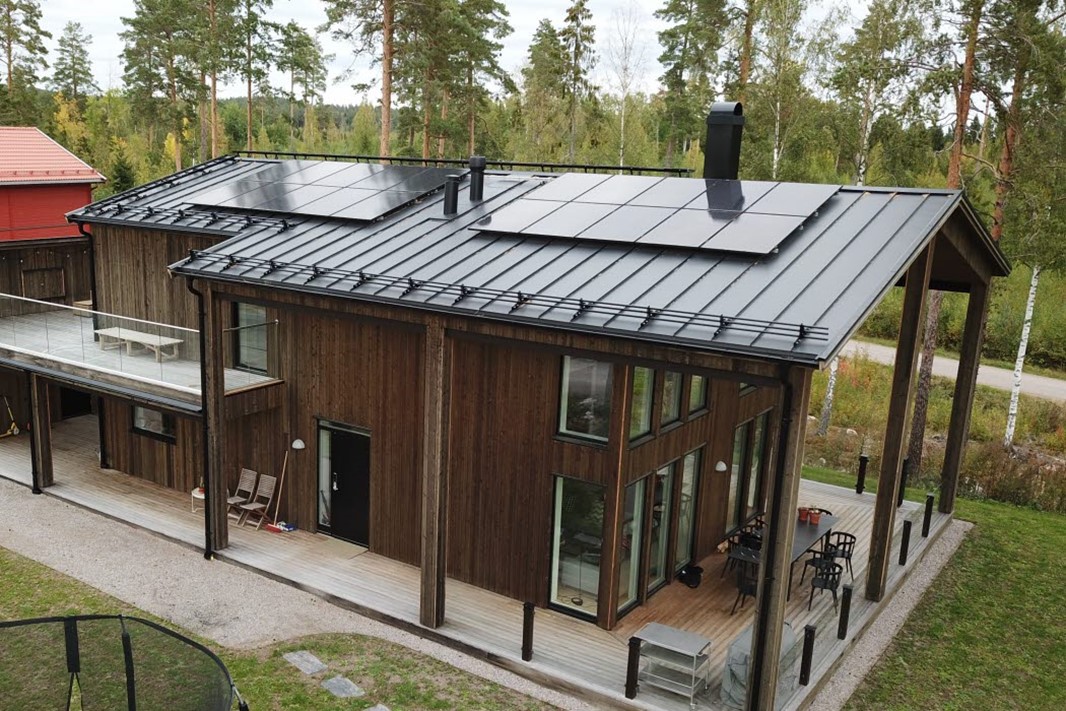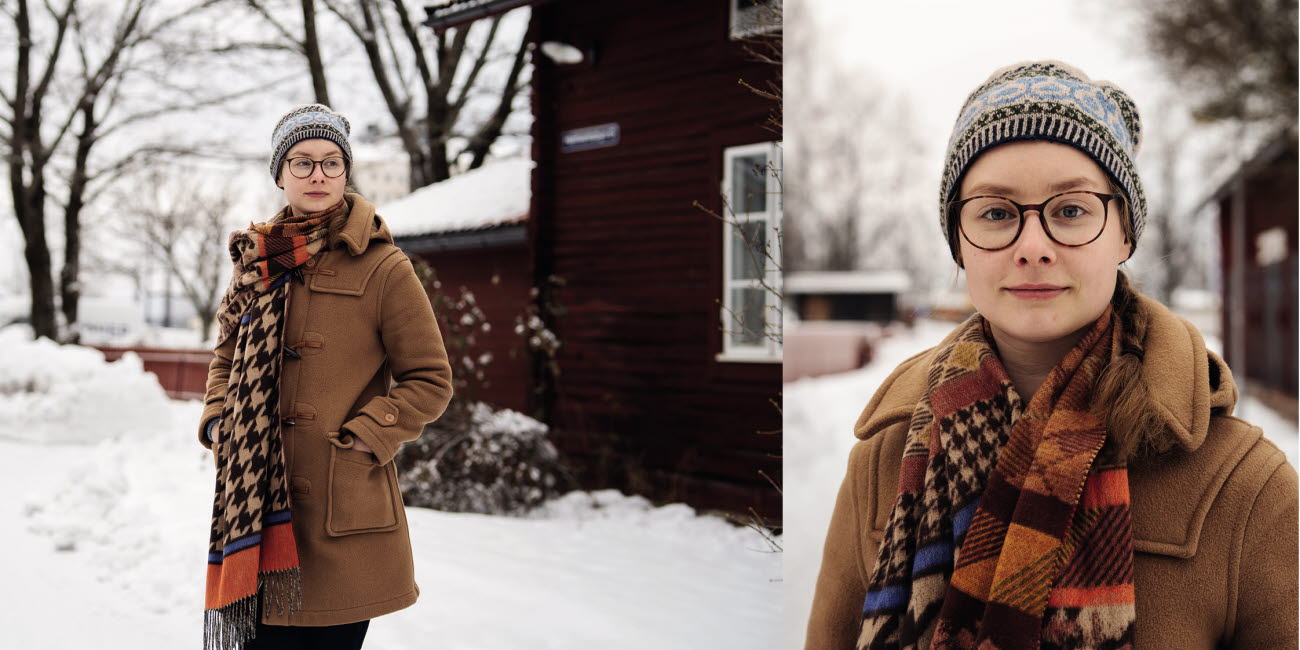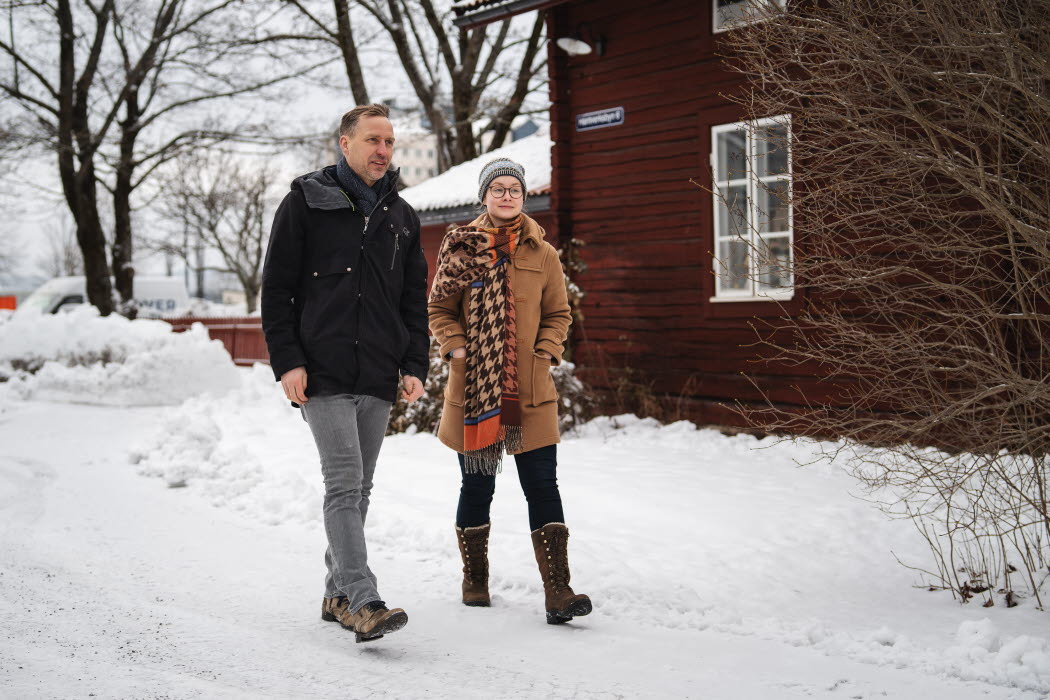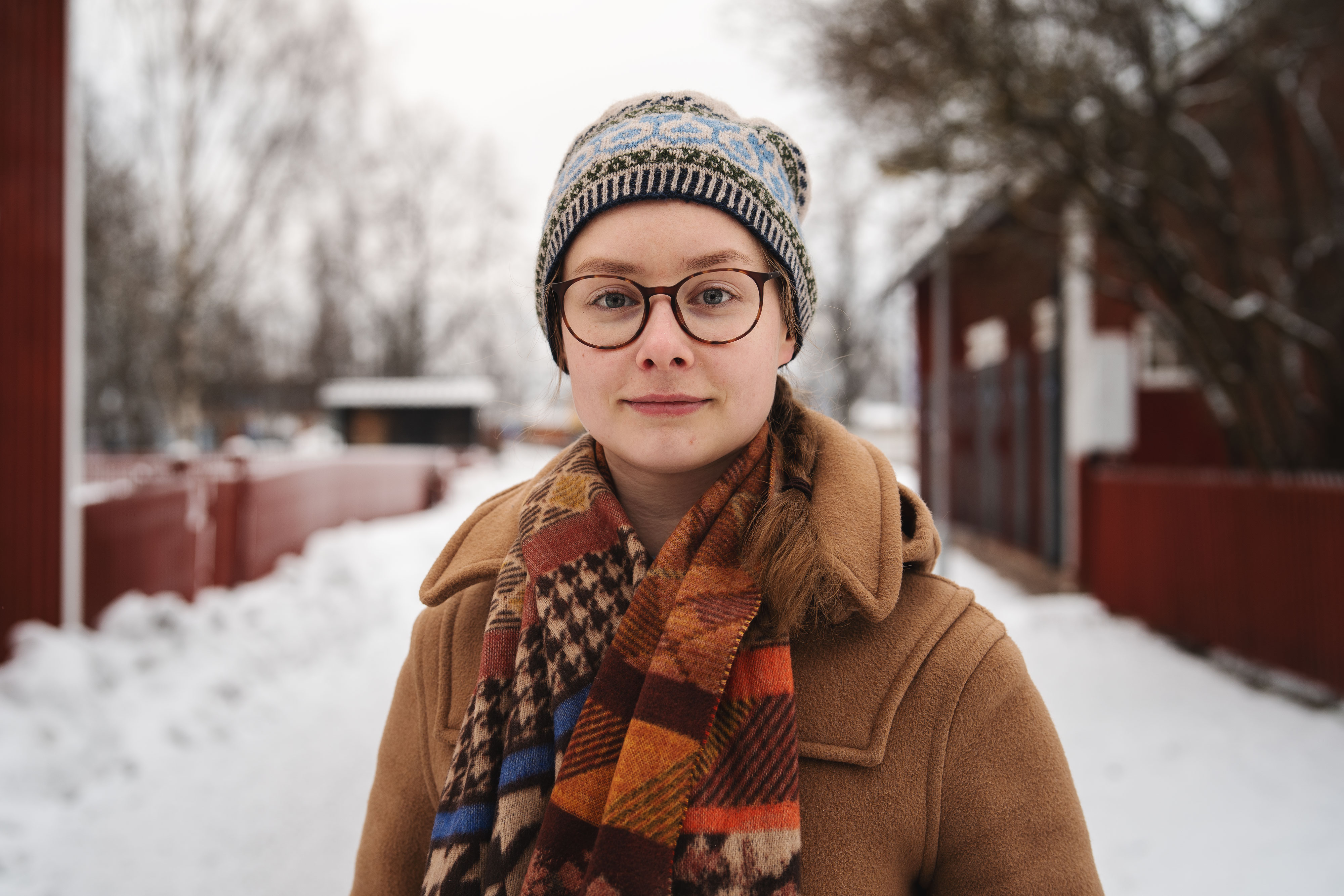
We aim to equip you with the skills and competence you need to be able to work towards lowering the whole life-cycle carbon footprint of buildings while ensuring comfortable living conditions for occupants.
Open to both on campus and online students, the programme will introduce you to innovative design concepts and novel approaches to help you tackle both current and future environmental and societal challenges.
We regularly assess the programme content and structure to ensure that it delivers the state-of-the-art knowledge and skills essential for you to enter the job market with confidence.
Should you apply?
You are strongly advised to apply to this programme if you are interested in working with green buildings and energy-efficient construction or if you would like to become a field specialist in advising homeowners, businesses, and local authorities on questions related to environmental and energy-conscious solutions.
We also welcome ERASMUS exchange students to attend our courses every year. Please contact the programme director to learn more about applying to study courses in the programme as an exchange student.
You can study this programme at our Borlänge Campus or online. If studying online, you can follow most of the lessons in real time from home or watch recordings at your convenience.
All students are expected to participate in laboratory sessions or similar on campus a few times each semester and are invited to regular site visits to our industry partners.
Developed from Dalarna University’s years of extensive research in construction technology and energy technology, the programme comprises 60 credits (1 credit = 1 ECTS) and can be completed in two semesters of full-time study. All courses are taught in English by international faculty.
Semester 1 (September–January)
- Energy-Efficient Buildings (7.5 credits)
- Solar Radiation and Solar Geometry (5 credits)
- Introduction to Bio-Climatic Design (2.5 credits)
- Building Energy Performance Simulation and Analysis (5 credits)
- Solar Building Design (5 credits)
- Low-Energy HVAC Systems (5 credits)
Semester 2 (January–June)
- Energy and Urban Planning (7.5 credits)
- Life Cycle Assessment and Cost Analysis (5 credits)
- Sustainable Building Rating Systems (2.5 credits)
- Thesis Work in Energy Efficiency in the Built Environment (15 credits)
The thesis can be carried out at the University or, upon approval, at a business or other organisation in Sweden or abroad.
Note: 1.5 credits equals one week of full-time study.
Degree Awarded
Master of Science (60 credits), Main Field of Study: Energy Technology
Tuition fees
Total for programme: 150,000 SEK*
*EU/EEA citizens are not required to pay tuition fees.
Tuition fees are paid in one-semester instalments. The first payment (75,000 SEK) should be made as soon as possible after you have received your invoice and no later than the deadline on the invoice. This allows for reasonable processing time for a residence permit application. The second payment (75,000 SEK) is made before the start of the second semester.
Visit our tuition fee webpage for more information about paying tuition fees and what is included in the fee.
If you have any questions about tuition fee payments, please e-mail tuitionfees@du.se.
Scholarships
Students admitted to the Master’s Programme in Energy Efficient Built Environment (EEBE) may be eligible for two scholarships offered by Dalarna University.
Choose Dalarna First Scholarship
If you apply on time and are admitted to the EEBE programme as your first choice on UniversityAdmissions.se, you are eligible for a one-time scholarship of 5,000 SEK. This amount is deducted from your first semester tuition fee, provided you also apply for the scholarship no later than February 15 (autumn intake).
Academic Excellence Scholarship
Students in the EEBE programme can also qualify for the Academic Excellence Scholarship, which recognises outstanding academic achievement during the programme.
- Semester Award: Receive 15,000 SEK per semester when you meet the criteria for outstanding academic results.
- Programme Distinction: An additional 15,000 SEK may be awarded if you receive the Semester Award in every semester of the programme.
To qualify for the Semester Award, you must:
- Complete all 30 credits that are part of the programme curriculum for that semester.
- Earn at least 15 credits with a mix of 5 or VG (pass with distinction) and 4 (pass with merit) grades — at least one course must have the final grade 5 or VG.
- Have all course results reported within six weeks after the semester ends.
The Semester Award is evaluated independently for each semester — you may receive it for one semester even if you do not qualify in the other.
For full eligibility details and how to apply, visit our scholarships overview webpage.
Swedish Institute Scholarships (SISGP)
A limited number of students from select countries may be eligible to apply for the Swedish Institute Scholarships for Global Professionals (SISGP), a national scholarship programme managed by the Swedish Institute. This scholarship is highly competitive and awarded independently of Dalarna University.
For full eligibility details and how to apply for Dalarna University’s own scholarships, visit our Scholarships Overview webpage .
Specific Entry Requirements
- Bachelor of Science from the construction-related field (architectural, building, mechanical, energy, or civil engineering) or equivalent of at least 180 credits (ETCS), or an equivalent degree. It is also possible to apply if you are currently completing the final year of studies leading to such a degree.
- Documented English language proficiency equivalent to English B/English 6 at Swedish upper-secondary school (more information below).
While not formally required for admission, proficiency in Microsoft Office (Excel, Powerpoint and Word) will be helpful to your success if you enroll in the programme.
Documents to Submit:
- Proof of a completed bachelor’s degree, equal to a Swedish bachelor's degree in one of the approved subject areas. If you are currently completing a degree you can apply please submit a certificate from your university.
Be sure to read the information specific to the country where you previously studied to know how to submit the appropriate documents. - Proof of English language proficiency equal to an IELTS result of 6.5 overall with no part of the test below 5.5
In some cases your previous studies may fulfill the English proficiency requirement. Please check the University Admissions information on English Language Proficiency to see if you are required to submit a TOEFL or IELTS test result.
If you have taken an English proficiency test that fulfills the requirements listed on the UniversityAdmissions.se website then you can ignore the information below.
For 2026, Dalarna University has made a temporary local exemption to the English proficiency requirements listed on the UniversityAdmissions.se website.
If you previously studied in India or Sri Lanka
Applicants from India and Sri Lanka should submit your upper-secondary documents to show your English proficiency as explained on the UniversityAdmissions website.
This will fulfill the formal English proficiency requirements for most courses and programmes at Swedish universities.
If you do not have the required proof of English proficiency from your upper-secondary studies and you have completed a 4-year bachelor’s degree majoring in a technical or science subject (such as engineering, IT or physics) which is equal to a Swedish bachelor’s degree, then you will not need to submit a TOEFL or IELTS result.
If you previously studied in Nepal
If you have not taken a TOELF or IELTS and you have completed a 4-year bachelor’s degree majoring in a technical or science subject (such as engineering, IT or physics) which is equal to a Swedish bachelor’s degree, then you will not need to submit a TOEFL or IELTS result.
Career Opportunities
The Master's Programme in Energy Efficient Built Environment will prepare you to be a professional working towards the delivery of energy-efficient solutions for the built environment.
Potential future employers are as follows:
- consultancy firms
- housing companies
- leading design and construction firms
- government and non-government organisations
Worldwide, there is a growing need for qualified professionals in this field who have a working knowledge of energy efficiency and the carbon footprint assessments of buildings (minimising upfront carbon embodied in building materials, lowering operational energy use, and saving carbon at the end-of-life stage through the reuse of materials). For you as a graduate, this means that you will enjoy great flexibility when it comes to putting your expertise into use within various fields of civil, environmental and construction engineering.
Programme content focuses on energy-efficiency challenges in both cold and temperate climates. The knowledge and skills you acquire from your studies will make you an attractive candidate within the construction industry in Europe, North America and China. Furthermore, the international character of the programme – in terms of both students and faculty – will not only prepare you to work in an international environment but also enable you to build a worldwide professional network.
Increasing Job Opportunities
In the global challenge presented by climate change, governments are increasingly under pressure to transition to renewable energy resources and to improve the energy efficiency of their built environment and thus, to curb their greenhouse gas emissions. While the number of professionals who are prepared to tackle this issue in its complexity is steadily growing, Sweden is leading the way in developing and adopting energy-efficient and environmentally-friendly technologies; studying here can provide you with a competitive advantage in this increasingly global job market.
Study at the PhD level
You can also pursue your studies at the doctoral level by taking Dalarna University's doctoral programme in Resource Efficient Built Environment.
Htun Htun — Structural Engineer, Limträteknik i Falun AB
EEBE, Class of 2025 • Based in Dalarna, Sweden

Snapshot
- Role: Structural engineer designing timber and long-span structures.
- Pathway: Networking + interview for StickFrame/laminated timber design role.
- Thesis link: LCA of Borlänge campus; strategies toward net-zero carbon.
- Language: Swedish not always required but very helpful in daily work.
- Advice: Be persistent; align roles with your thesis and career goals.
Read more (click to expand/collapse)
My background is Civil Engineering and I worked as a construction project engineer in Myanmar before coming to Sweden. I now work as a structural engineer at Limträteknik i Falun AB, an engineering consultancy focused on innovative timber construction and complex, long-span structures.
During my master’s studies, I gained valuable insights in energy-efficient building design, material selection, energy simulation, indoor thermal comfort, urban planning and design, and carbon-reduction approaches through workshops, seminars, and practical projects. The faculty were supportive and kept us informed about job opportunities via job fairs and study visits.
My thesis was a Life Cycle Assessment of the Borlänge campus building, aligning with Paris Agreement goals. It highlighted how timber construction can effectively support net-zero targets. I learned of a vacancy at Limträteknik through networking; the EEBE programme strengthened my confidence and set me on the right path in laminated timber design.
Working in a Swedish-speaking environment helps me improve my Swedish daily. While not always mandatory, Swedish proficiency adds value for stakeholder engagement and collaboration. Getting a job in Sweden isn’t easy, but with a clear plan and persistence, it’s achievable.
Vignesh — PhD Student, Uppsala University
EEBE, Class of 2025 • Mechanical Engineering

Snapshot
- Role: PhD student in Mechanical Engineering, Uppsala University.
- Pathway: Built on EEBE thesis in energy efficiency/renewables; applied to competitive PhD calls in Sweden.
- Research link: Coursework + simulation tools + thesis provided the research foundation.
- Advice: Use your thesis to build connections; contact supervisors early; apply confidently.
Read more (click to expand/collapse)
My background is in Mechanical Engineering, and I chose Sweden for its strength in renewable energy and sustainability. The EEBE programme exposed me to solar technologies, energy-efficient building design, and simulation tools that connected directly to my research interests. My master’s thesis on energy efficiency in buildings was the bridge to doctoral work.
After completing the programme, I applied for PhD positions in Sweden. The process was competitive, but skills in research methods, data analysis, and project work from EEBE made my application strong. I was accepted to Uppsala University as a PhD student in Civil and Industrial Engineering.
My advice is to focus on your thesis—it can open doors to both research and industry. Reach out to professors, ask questions, and apply even if a position seems competitive. With persistence and a targeted approach, opportunities are there.
Stay in Dalarna and look for a job after graduating
You can apply for a 12-month residence permit to stay in Sweden and look for work after you complete a degree programme of at least 60 credits. International students are encouraged to stay in Dalarna and look for a job after graduating from the Master's Programme in Energy Efficient Built Environment.
Major employers include SSAB and Borlänge Energi, while nearby Ludvika—about a 30-minute commute—hosts Hitachi Energy, a global leader currently expanding at record pace, including work on the largest export order in Swedish history. The area is also set to welcome one of Sweden’s largest data centres, further strengthening the region’s role in innovation and technology.
Using your degree overseas
The degree awarded by Dalarna University for this programme is internationally recognized and has been used by previous students to attain employment or pursue further studies outside of Sweden.
You can also apply to receive an Erasmus+ grant for an internship, even up to 12 months after completing your studies. This opportunity is available to all students in the programme, regardless of nationality, who pursue an approved internship within an Erasmus+ programme country other than Sweden.
A hybrid learning environment
The Master’s Programme in Energy Efficient Built Environment is offered both on campus in Borlänge and online. Classes are designed so that campus and online students interact with one another, and recordings are available for flexible study. Even online students are required to attend some mandatory on-campus activities each semester, such as hands-on workshops or specific exams. These are scheduled well in advance to give you time to plan travel and accommodation.
A small and diverse community
Typically, 10–15 students study on campus and 25–35 study online. Students join the programme from many different countries and academic backgrounds, which creates a stimulating exchange of knowledge and experience and enriches your learning. At Dalarna University, the small size of classes also means you will quickly get to know your classmates and teachers.
What your studies will involve
During the programme, you will attend lectures, complete practical exercises and labs, participate in seminars and group projects, make field trips, and take exams. Each week you can expect 10–20 hours of class time plus 30–40 hours of independent study. Several courses are interdisciplinary with the Master’s Programme in Solar Energy Engineering, giving you additional opportunities for networking and cross-disciplinary exchange. The knowledge you gain and the connections you build—both inside and outside the classroom—will support your professional development.
If you are studying on campus
Campus Borlänge is located two hours north of Stockholm and 20 km from the historic town of Falun, the political centre of the County of Dalarna. Borlänge combines thriving business and industry with easy access to Sweden’s natural landscapes. Major companies such as SSAB, Hitachi Energy, and Clas Ohlson are based here, offering a dynamic local environment.
If you are studying online
Dalarna University has been a pioneer in online education in Sweden. Our classrooms are equipped so that online students are fully integrated into lectures and discussions. You will also benefit from a range of study tools and support available for online learners.
Research and Industry Collaboration
Our partners in research and industry provide you with real-world problems, hands-on experience and good potential for employment upon graduation. The construction sector is particularly strong in Dalarna, and many local businesses and organisations maintain excellent contact with the University.
Dalarna University, together four other Swedish Universities and RISE (Research Institutes of Sweden AB) , has been granted a five-year grant from the Swedish Energy Agency to form a competence center for solar energy, called Solelforskningscentrum Sverige (SOLVE). This creates a strategic partnership between Sweden's research base in solar technologies and a broad and committed group of actors in the public and private sector.
Besides the opportunity to embark upon an industry-delivered research project in your thesis, we also aim to give you the opportunity to cultivate close connections with the industry through visits to construction sites, cutting-edge facilities, and innovative companies, and insight into pioneering projects. You will also attend lectures by guest speakers who have expertise in such areas as district heating and cooling, solar engineering, sustainable urban planning, and climate-conscious urban design. These activities will serve to increase your awareness of the latest research and development trends in this expansive field.
She was certain – studies were not for her. Now she is a doctoral student. When she chose to study at Dalarna University, Marieke Rynoson changed the course of her future and, what is more, the skills and knowledge she has so far acquired through her studies are in high demand.
From northern Germany, Marieke grew up in a family that every summer headed north to Sweden. Huddled in the back seat of the family car, between luggage and her father's parachuting gear, she could hardly have imagined that one day she would call the county of Dalarna in central Sweden her home.

After upper-secondary school, Marieke thought her academic life was behind her: she wanted to work with something concrete, something practical. So it was that she began an apprenticeship as a church painter, a job where her interest in historical buildings came into play and where practical work featured strongly. Her curiosity grew for the renovation of old buildings, which then led her to pursue studies in construction engineering. The next thing to happen is that she meets Rikard, a mason, and moves to Säter, a small town in Dalarna.
Age: 29
Background: church painter, Bachelor's degree in Construction Engineering, Master's degree in Energy Efficient Built Environment
Interests: Makes her own clothes
Current position: Doctoral student in the field of energy efficiency
At first she wondered what she would do in Sweden and whether she would be able to put her education to good use. She soon found out that Dalarna University at its campus in nearby Borlänge offered a Master’s programme in energy-efficient construction, a perfect match with her previous knowledge as well as her interest in sustainable living.
- It felt like it was meant to be – that I was supposed to end up here just so that I could take this programme, says Marieke.
She soon found out that returning to student life after several years as a working professional was an easier transition than she might have imagined.
- A small university like Dalarna University really suits me: here you get to know everyone. People treat each other like equals, regardless of whether they’re a professor or a student. We get the sense that our teachers really want to see us be successful.
Her university instructor Jonn Are Myhren nods in agreement.
- We study issues related to a sustainable society, an issue that is always relevant. Our students' knowledge must always be up-to-date, and they need to follow developments as they happen. This is where our research contributes a great deal, says Jonn Are, who is director of the Master's Programme in Energy Efficient Built Environment.
Jonn Are and Marieke agree that the development and design of future energy-efficient buildings and homes are together an important social issue, one that many companies have an interest in as well, something that has not gone unnoticed.
- During the programme, we got to make regular visits to companies, which meant students got to meet a number of potential employers. It also meant that all the theory we learned was put into practice. This increased our motivation because it became clear that our skills are in demand, says Marieke.

Marieke Rynoson and Jonn Are Myren are now colleagues. While she looks forward to pursuing her studies in energy-efficient construction, they both look forward to working from the new energy-efficient university campus in central Borlänge, which will be ready for occupancy by autumn 2024.
When Marieke had completed her Master’s, she looked forward to working with the analysis of buildings to see how they could be made more energy efficient. She also wanted to combine her interest in old buildings with her new knowledge and skills in a practical way.
- But then one of my teachers asked me if I’d ever considered doing research. "What, me?" was my spontaneous response. But that's how it all began, she laughs.
Her teacher had noticed Marieke's commitment and interest during her studies and saw an opportunity for her to acquire even deeper knowledge. Over the four years to come, Marieke will study the integration of solar cells in the energy systems of buildings. What happens after that is something Marieke has yet to give any thought to. However, her interest in old buildings – the former church painter that she is – and her knowledge of how energy efficiency can be created are aspects that she hopes she can apply to her own house one day.
– My studies opened up opportunities I didn't even know I had, she says. Here I am now – somebody who didn’t plan to study at all, and now it's my job – to study! Life can always take you down surprising new paths.
